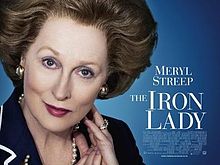Thatcher: Over 20 years after her resignation after approaching 12 years as PM, Margaret Thatcher still polarises opinion and arouses more emotion than almost any politician of the modern era. Some will tell you that she was the best PM since Churchill, others that she tore society apart, ripped traditional industry from the British heartland, encouraged greed and caused unemployment. Any movie about this woman, especially without the benefit of hindsight, will inevitably be controversial.
Why not leave it until after her death, you may ask. Maybe they were getting in early, but Thatcher remained obstinately alive? Even our PM believes it to be “too soon“. Given the revisionist nature of how history and politics change after the death of a leader, the same movie may have been very different a few years hence, but for now it should be judged on its merits.
To begin with, it’s not one movie but two. One is truly excellent, the other highly dubious. As a portrait of a woman coping with grief at the outset of Alzheimers, it’s little short of amazing. That the characters were impersonations of real people was almost irrelevant, but Meryl Streep and Jim Broadbent do an incredible job of inhabiting the personas of much-mimicked public figures, such that they barely seem like impersonations at all. That is the kite mark of quality acting – that they do not appear to be acting.
More than this, La Streep does a phenomenal job in portraying Thatcher’s slow slide into senility. Every facial tic, every eye movement, every nuance of expression speaks volumes for the despair and increasing confusion, the remnants of authority, the exasperation, a full panoply of emotions even without the steel-fist-in-velvet-glove voice being exercised. Carol Thatcher looks on, portrayed as lacking empathy for her mother’s mindset (I was going today Thatcher junior is played as an emotional half-wit, but maybe that is unkind.) Wisely, Mark Thatcher is not featured on screen at all.
These components of the film are truly inspired, they work brilliantly, which brings the rest of the movie into sharp relief. It’s not that it’s all bad – many fine actors get their 15 seconds of fame as the audience plays spot the celeb with a string of politicos and journos, from Richard E Grant as a spritely Heseltine and John Sessions an erudite Heath, through to David Cann as a Robin Day lookalike.
But then, that’s the point: this his history as a caricature, a strip cartoon of episodes from the rise and fall of the illustrious Thatcher. The headlines, distorted and without context. Politically naive, some might say, but also a distortion of the reality behind these glimpses. The example Kermode quotes is the infamous St Francis of Asissi speech, which in reality was given to a raucous background of protesters shouting, not in complete silence while surrounded by police.
There is much stylised for this movie, which is fine if you do not represent it as reality. Ah, the film-makers might say, but this is the ageing Thatcher remembering the past through a prism, much as Salieri’s recounting his tale of causing the death of Mozart in Amadeus is told with the benefit of much distortion of fact. Except in this case it appears to be more designed to present as fact information which in a debate open to all sides would be heavily disputed.
True, Thatcherite opposition is given a chance to riposte, but mostly to allow the lady to deliver conclusive put-downs. Michael Foot (Michael Pennington) is given a fair chance to demonstrate his eloquence, but the most critical moments are when the Prime Ministerial limo drives through hordes of protesters during peak of opposition to her government, while its occupant remains stoic and barely moved. The only occasion when she appears less than controlled is during a bizarre outburst while chairing a Cabinet Meeting, veering sharply between pedantic school ma’am and mafia hit man. At this point, you realise she has lost the Cabinet and her colleagues start talking about opposition to her leadership openly.
Thatcher’s memory may cast her in the best light for most purposes, but what is missing is the political skulduggery, the back room infighting, the ruthless outmanoeuvring of rivals. For example, the young Margaret Roberts, watched by an amused Dennis Thatcher, brays on to the men at a selection committee meeting for the Dartford constituency and is roundly patronised by the leading lights of the local party, all men. Yes, I have no doubt that she had to overcome considerable male opposition to get selected and eventually elevated to a safe seat in Finchley, but what is missing here is how she achieved it. Not, one suspects, by talking from a soap box about the convictions gained from her father’s grocer’s shop in Grantham. There must have been an edge of competitive steel, but this movie fails to demonstrate such a ruthless edge.
The conclusion is that while I would not agree entirely with the view of the left that this is an outright hagiography, it is certainly heading in that direction by attempting to evoke sympathy for its subject. Frankly, it would have been far better to leave most of the politics out and explore more facets of the personality and psychology of Thatcher in an objective and rounded way, and deal with the political history in another movie, probably one devised and written after the death of the lady herself. Arguably she was so intensely political that it would be impossible to hide away that side of her life, but the other half of the film negates that criticism with surgical precision. A character study of the traits of Thatcher is much the more interesting movie.
Which reminds me of Spitting Image. Ah, the greatest satire show of my generation, what a magnificent contrast to the Iron Lady view of life. Thatcher and Cabinet in a restaurant. Waitress asks what she would like.
Thatcher: “I’d like a steak” Waitress: “How would you like it?” Thatcher: “I’ll have it raw please.” Waitress: “And the vegetables?” Thatcher: “They’ll have the same.”




Attractive section of content. I simply stumbled upon your web site and in accession capital to claim that I get actually enjoyed account your weblog posts. Anyway I will be subscribing to your augment and even I success you get right of entry to persistently fast.